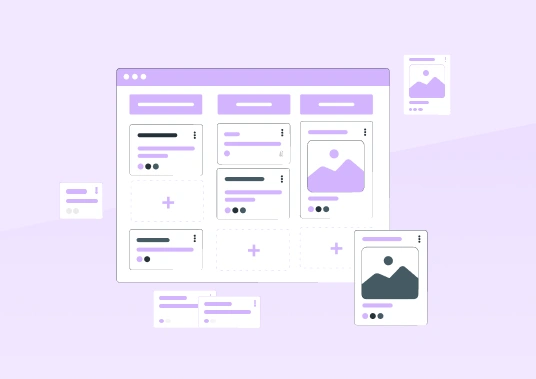Your ecommerce sales are exploding and you’re looking for the right CRM to stay on top of things. Great going so far! From here on, a lot will depend on the CRM you select—whether it’s a generic platform or a specialized ecommerce CRM.
In this post, we will discuss why you need an e-CRM and not just any CRM. We’ll also explore the best CRMs for e-commerce, their key features, pros and cons, and prices. But first, let’s see why it’s important for ecommerce businesses to use a dedicated CRM.
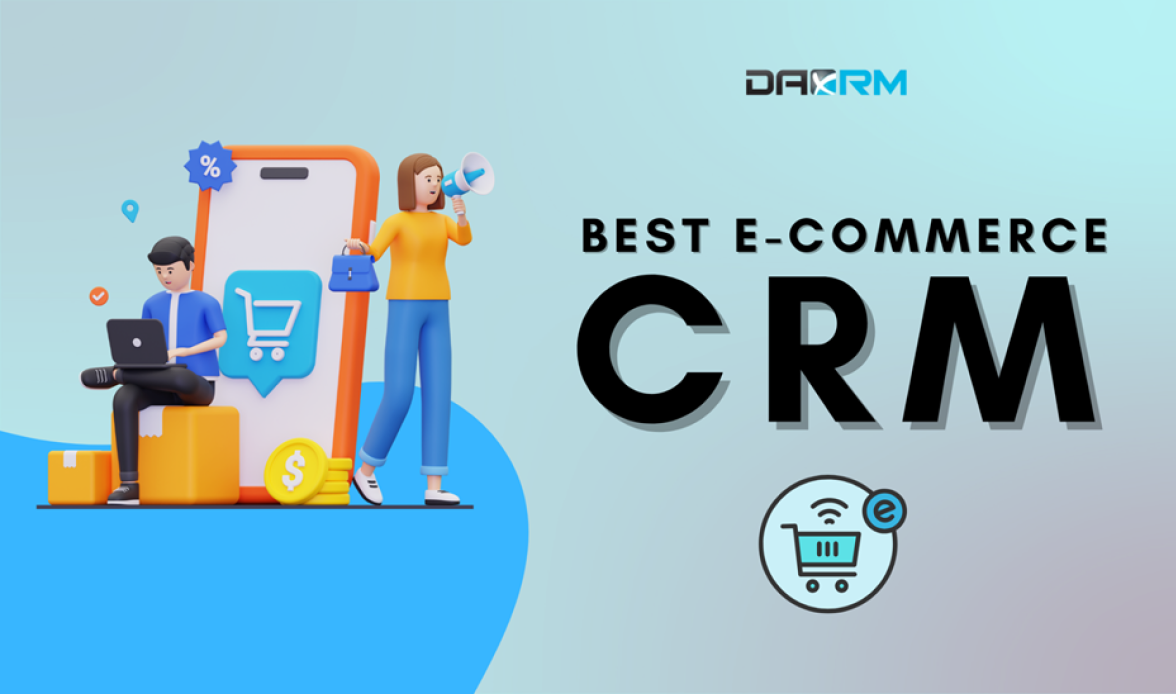
Why E-commerce Businesses Need a Dedicated CRM
E-commerce CRM systems, also called e-CRMs, go beyond traditional customer relationship management. They offer a holistic platform for customer data, order management, marketing automation, and more.
An e-commerce CRM allows you to track customer journey, identify customer pain points, and personalize marketing campaigns. It empowers you to nurture leads, segment customers based on their preferences, and implement effective retargeting strategies, all of which are critical for driving conversions.
Essential Features an E-commerce CRM
To analyze customer information and sales patterns, an e-CRM must have certain essential features. These include:
- Integration with E-commerce Platforms: You'll want seamless integration with popular e-commerce platforms like Shopify, Magento, and WooCommerce. This is key for effortless data synchronization and streamlined operations.
- Customer Segmentation: Look for the ability to segment your customers based on demographics, purchase history, and behavior. This allows for targeted marketing and personalized communication.
- Marketing Automation: Automation of email marketing, social media campaigns, and other marketing initiatives is critical. It saves you time, boosts efficiency, and ensures consistency in your messaging.
- Order Management: Get real-time tracking of orders, inventory levels, and shipping information, so you can prevent stockouts, delays, and customer dissatisfaction.
- Analytics and Reporting: Your e-CRM should be tightly integrated with analytics platforms such as Google Analytics and social media insights. This lets you dissect customer behavior, campaign performance, and sales trends to make data-driven decisions.
Finding The Best CRM for Ecommerce Stores
Now, let's explore the six best ecommerce CRMs for 2024, evaluating their pros, cons, key features, and subscription costs.
1. DAXRM
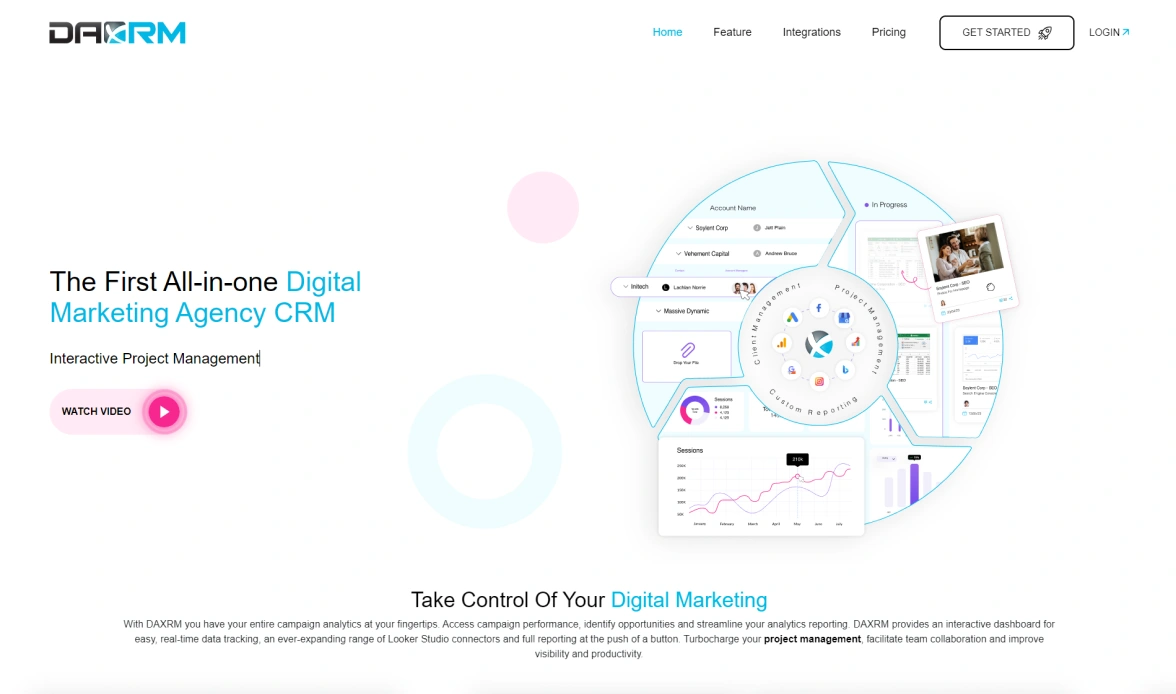
DAXRM is a powerful customer data platform and client management tool designed specifically for digital marketing agencies.
It empowers you to consolidate client data, streamline project management, automate reporting, and gain valuable insights to optimize your campaigns and client relationships.
Main Features
- Client Management: Centralized platform for storing and managing client information.
- Project Management: Tools for organizing and tracking projects, tasks, and deadlines.
- Automated Reporting: Generate customized reports on campaign performance and other key metrics.
- Data Insights: Access valuable insights to inform your marketing strategies and improve client results.
- Agency Tools: Specialized features for invoicing, time tracking, and team collaboration.
- Subscription Cost: Starting at $25/month for the Essentials Plan. Custom pricing is also available for larger agencies.
Why It’s Great
- Centralized Client Management: Manage all your client information, communication, and projects in one place.
- Streamlined Project Management: Organize and track tasks, deadlines, and progress for multiple client projects.
- Automated Reporting: Generate comprehensive reports on campaign performance, SEO rankings, and other key metrics.
- Data Insights: Uncover actionable insights to optimize your marketing strategies and improve client results.
- Agency-Focused Features: DAXRM includes specialized tools for invoicing, time tracking, and team collaboration.
What It May Lack
- May Not Be Ideal for E-commerce Businesses: DAXRM's primary focus is on agency operations and client management, and may not offer the same level of e-commerce-specific features as other CRMs on this list.
- Learning Curve: Some users may find the initial setup and onboarding process to be slightly complex.
2. Metrilo
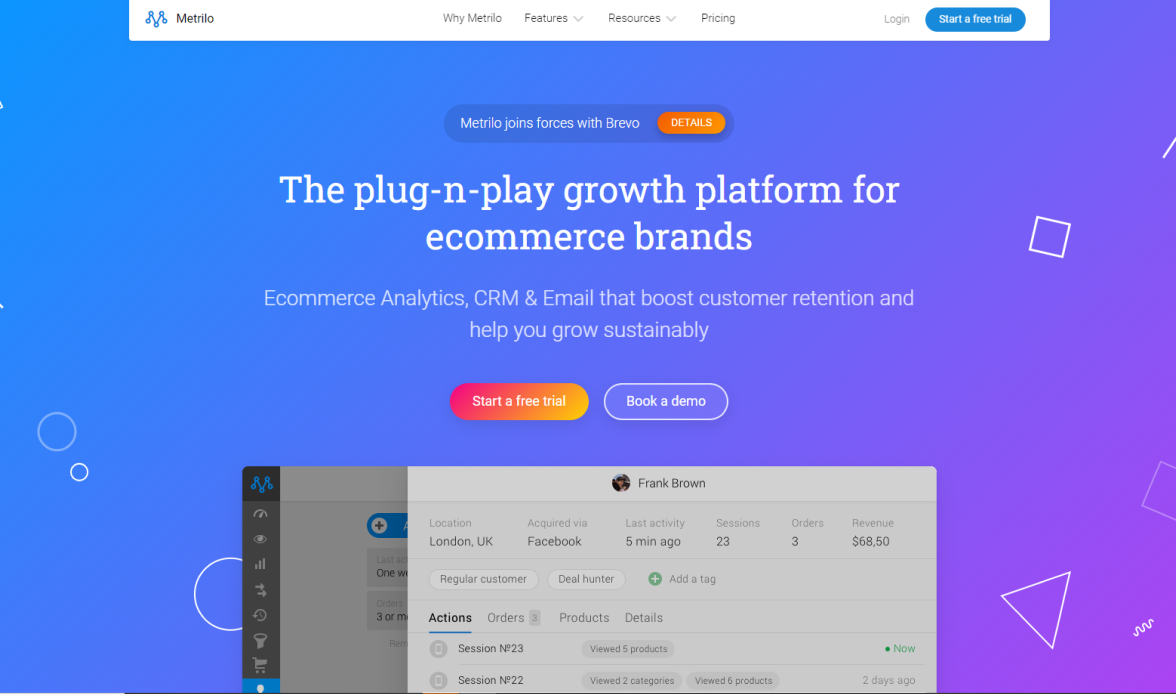
If you’re looking to enhance your understanding of your customers and drive sales growth through sharp targeting, Metrilo is an excellent choice. Its combination of analytics, segmentation, and automation features make it a valuable tool for maximizing customer lifetime value.
Main Features
- E-commerce Analytics: Track customer behavior, order history, product performance, and other key metrics.
- Customer Segmentation: Create targeted segments for personalized marketing campaigns.
- Email Marketing Automation: Automate email campaigns based on customer behavior and triggers.
- Product Recommendations: Provide personalized product recommendations to increase sales.
- Retention Analysis: Identify and engage with at-risk customers to improve loyalty.
- Subscription Cost: Starting at $119/month.
Why It’s Great
- E-commerce Focused Analytics: Gain deep insights into your customers' journey, from acquisition to retention.
- Customer Segmentation: Segment your audience based on purchase history, behavior, and other criteria for targeted marketing.
- Marketing Automation: Automate email campaigns, personalized product recommendations, and other marketing initiatives.
- Retention Analysis: Identify at-risk customers and implement strategies to improve customer loyalty.
- User-Friendly Interface: Metrilo's intuitive interface makes it easy to navigate and use, even for those without technical expertise.
What It May Lack
- Limited Third-Party Integrations: Metrilo may have fewer integrations compared to some other e-commerce CRMs.
- Pricing: Metrilo's pricing can be on the higher side for smaller businesses.
3. HubSpot CRM
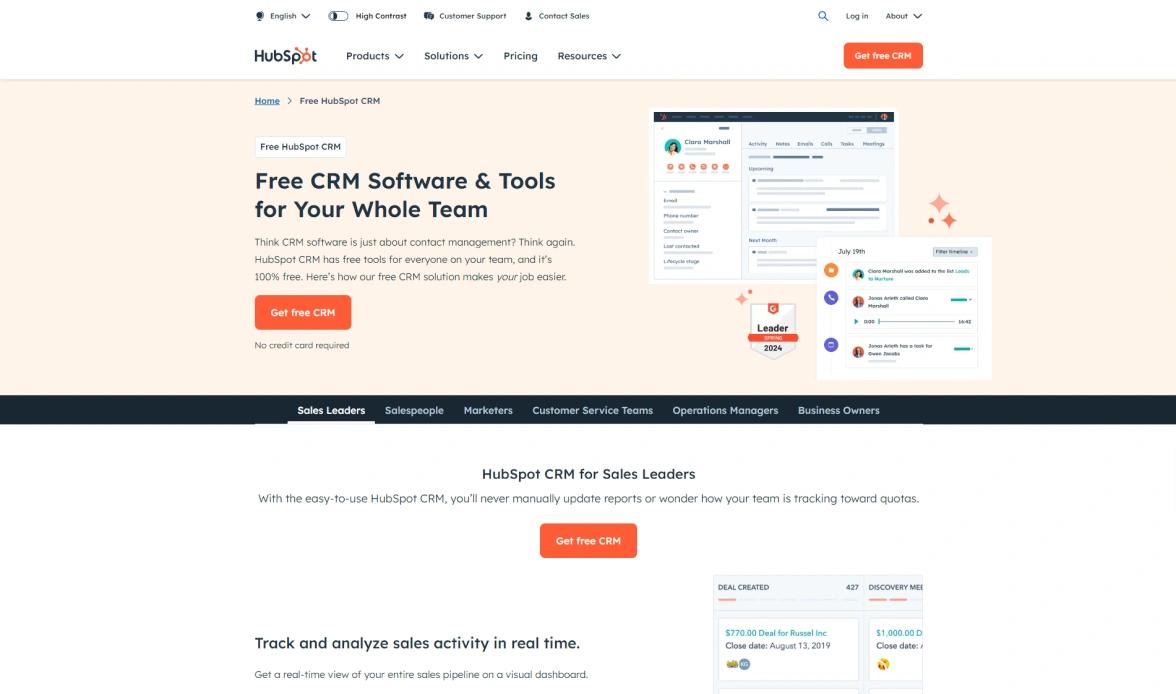
Alright, let's talk about HubSpot CRM. If you're looking for a CRM that's both versatile and scalable, HubSpot's got you covered. Whether you're just starting out or you're a seasoned pro, HubSpot's suite of features – from marketing automation to sales pipeline management and customer service tools – can help you build and nurture lasting customer relationships.
Main Features
- Contact Management: Keep track of all your leads and customers in one place.
- Lead Tracking: Monitor your leads' journey through your sales funnel.
- Email Marketing Automation: Set up automated email campaigns to nurture leads and engage customers.
- Sales Pipeline Management: Visualize and manage your sales process from start to finish.
- Customer Service Tools: Provide top-notch customer support and build customer loyalty.
- Subscription Cost: Free plan available; paid plans starting at $45/month
Why It’s Great
- Free to Get Started: Dip your toes in with a free plan that offers basic features.
- Plays Well with Others: HubSpot CRM integrates seamlessly with other HubSpot products, creating a powerful marketing and sales ecosystem.
- Marketing Automation: Automate your marketing efforts and watch your leads convert like magic.
- User-Friendly: Even if you're not a tech whiz, you'll find HubSpot's interface intuitive and easy to navigate.
What It May Lack
- Advanced Features Come at a Cost: If you want to unlock the full potential of HubSpot CRM, be prepared to invest in their paid plans.
- Can Be Overwhelming: For smaller businesses with simpler needs, the sheer number of features might be a bit much.
4. Salesforce CRM
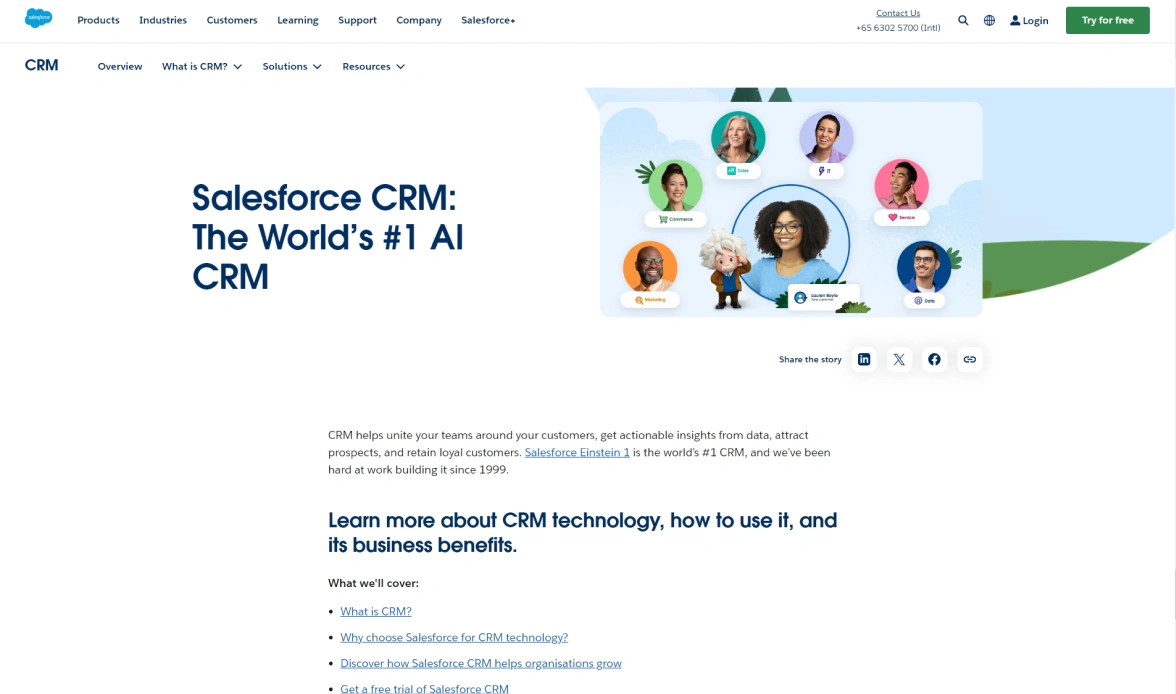
If you're looking for a CRM that can adapt to your unique needs and grow with your business, Salesforce is definitely worth considering. A household name in CRMs, it's a powerhouse trusted by businesses of all types and sizes around the world. Salesforce is known for its extensive features, deep customization options, and scalability, making it a go-to choice for ecommerce businesses experiencing rapid growth.
Main Features
- Contact and Lead Management: Keep track of all your leads and customers in one centralized location.
- Opportunity Tracking: Manage your sales opportunities from initial contact to close.
- Sales Forecasting: Predict future sales and make informed business decisions.
- Marketing Automation: Automate your marketing efforts to generate leads and nurture relationships.
- Customer Service Tools: Provide exceptional customer service and resolve issues quickly.
- Subscription Cost: Starting at $25/user/month
Why It’s Great
Customization: Tailor Salesforce to fit your unique business processes and workflows.
Feature-Rich: Salesforce offers a vast array of features and integrations, so you can build a CRM that meets your exact needs.
Scalability: Whether you're a small startup or a large enterprise, Salesforce can handle your CRM needs.
What It May Lack
Complexity Can Be Daunting: With its extensive features and customization options, Salesforce can have a steep learning curve.
Price Tag: Salesforce can be a significant investment, especially if you need to leverage its advanced features.
5. Zoho CRM
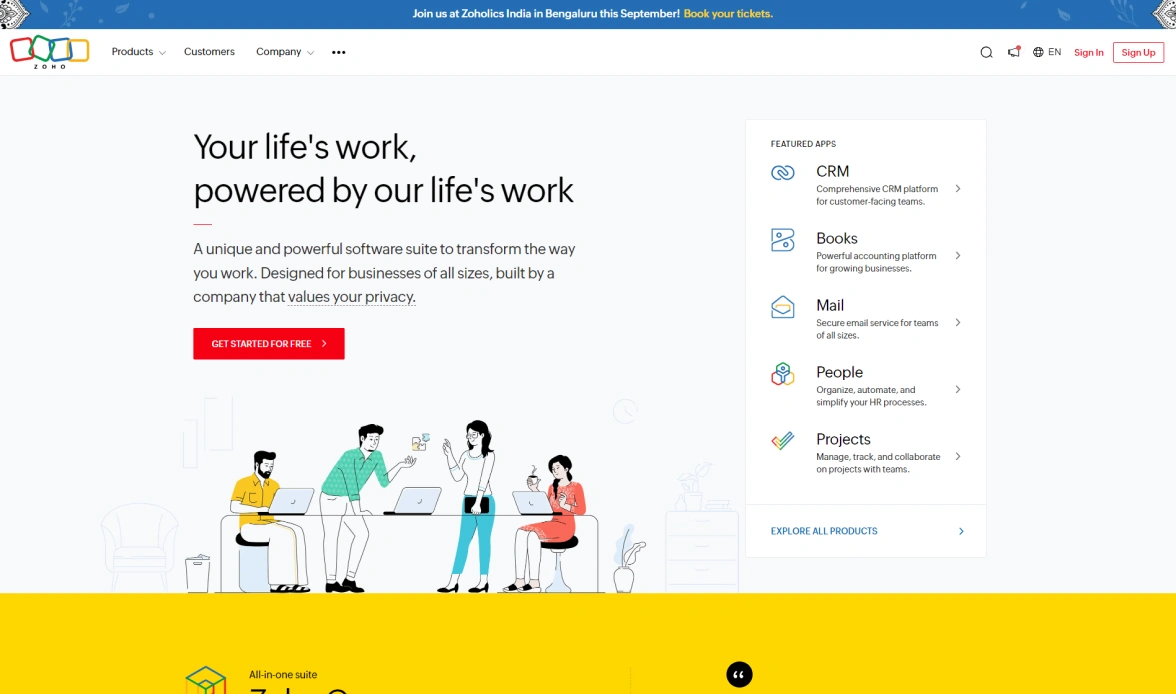
Zoho CRM is a cost-effective and user-friendly CRM solution that caters to the needs of small and medium-sized e-commerce businesses. It provides essential features like lead management, sales pipeline tracking, and email marketing automation. It's user-friendly, feature-rich, and offers excellent value for money. If you're looking for a CRM that's both affordable and effective, give Zoho CRM a try.
Main Features
- Lead and Contact Management: Organize and track your leads and customers effectively.
- Sales Pipeline Tracking: Visualize your sales process and monitor deals as they move through your pipeline.
- Email Marketing Automation: Create and automate email campaigns to nurture leads and engage customers.
- Social Media Integration: Connect your social media accounts to monitor conversations and engage with your audience.
- Mobile App: Access your CRM data and stay productive on the go.
- Subscription Cost: Starting at $14/user/month
Why It’s Great
Easy on the Wallet: Zoho CRM offers competitive pricing, making it accessible for businesses with tighter budgets.
Intuitive Interface: You'll find Zoho CRM's interface straightforward and easy to use, so you can spend less time learning the software and more time focusing on your customers.
Feature-Packed: Zoho CRM offers a wide range of features, from lead management to sales pipeline tracking and email marketing automation.
Mobile Access: Stay connected to your CRM data on the go with Zoho's mobile app.
What It May Lack
- Integrations Can Be Limited: While Zoho CRM integrates with many popular apps, its third-party integration options might not be as extensive as some other CRMs.
- Customer Support: Some users have reported that Zoho's customer support can be a bit slow to respond.
6. Pipedrive
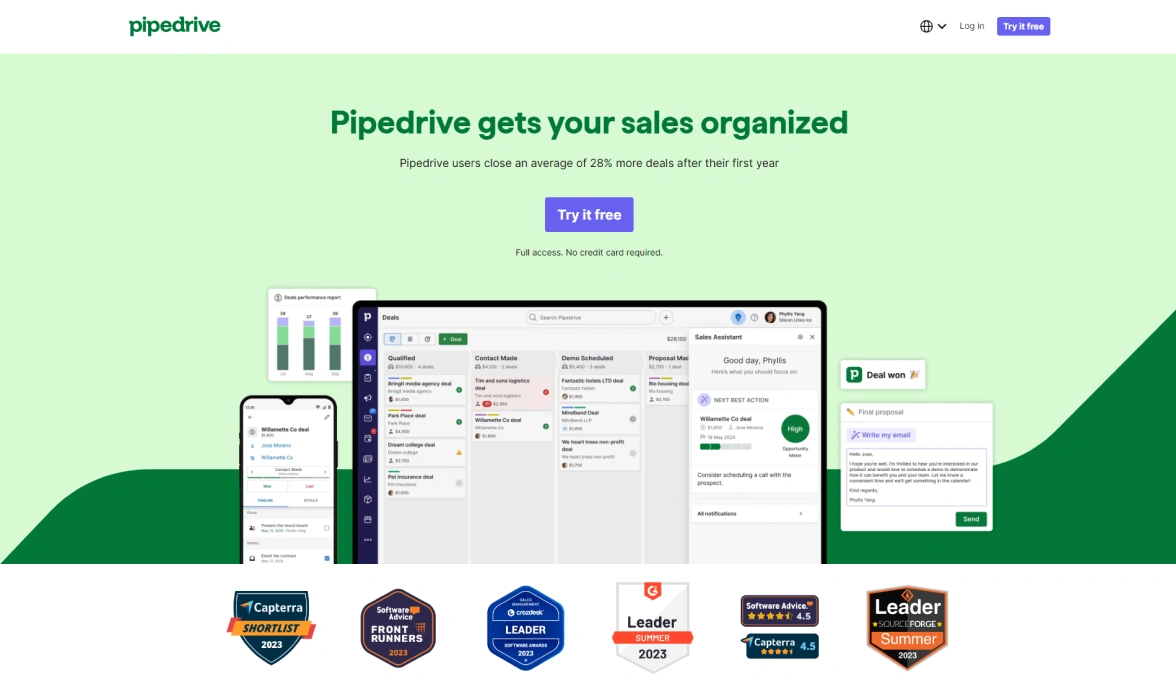
If your e-commerce clients are looking for a CRM that focuses on sales pipeline management and deal tracking, Pipedrive is a strong contender. It offers a visually intuitive interface and powerful automation features to help sales teams close more deals and improve their overall efficiency.
Key Features
- Visual Sales Pipeline: Track deals and their progress through a customizable visual pipeline.
- Sales Automation: Automate repetitive tasks, such as lead nurturing and follow-up emails.
- Lead Management: Capture and qualify leads, track their interactions, and convert them into customers.
- Email Integration: Connect your email inbox to Pipedrive to track communication and automate follow-ups.
- Reporting and Analytics: Gain insights into sales performance and team productivity with customizable reports and dashboards.
- Subscription Cost: Starting at $14.90/user/month (billed annually).
Why It’s Great
- Visual Sales Pipeline: Pipedrive's visual pipeline provides a clear overview of your sales process, making it easy to track deals and identify bottlenecks.
- Sales Automation: Automate repetitive tasks and workflows to save time and improve sales productivity.
- Lead Management: Capture and nurture leads, track their progress through the sales funnel, and convert them into paying customers.
- Customizable: Tailor Pipedrive to your specific sales process and workflows with custom fields, stages, and pipelines.
- Integrations: Pipedrive integrates with a wide range of popular tools, including e-commerce platforms, email marketing software, and communication tools.
What It May Lack
- Limited Marketing Features: Pipedrive primarily focuses on sales pipeline management and may not offer the same depth of marketing automation features as other CRMs.
- Can Be Pricey: While Pipedrive offers competitive pricing, it can be relatively expensive for smaller businesses or those with limited budgets.
Conclusion
Choosing the right e-commerce CRM is crucial for digital marketers and SEO strategists looking to drive business growth in 2024. Each of the CRMs mentioned above offers unique advantages and caters to specific needs.
Consider your budget, business size, and desired features when making your decision. Remember, a well-implemented e-commerce CRM can be the catalyst for enhanced customer engagement, optimized marketing campaigns, and ultimately, increased revenue.
Do you have a favorite e-commerce CRM? Share your thoughts and experiences in the comments below! Let's continue the conversation and learn from each other.
